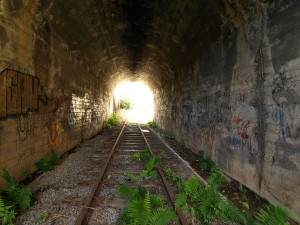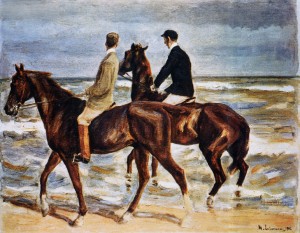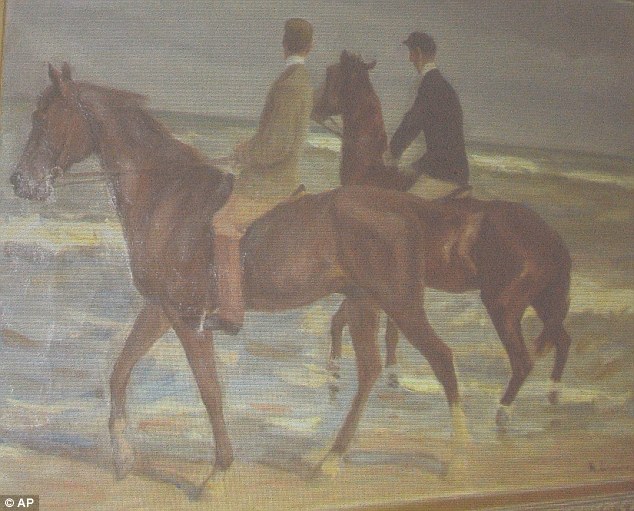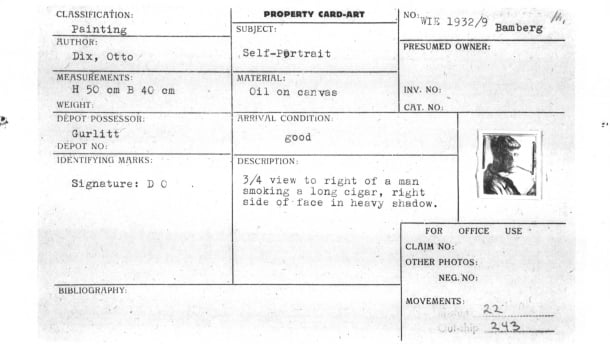I mostly ignored the initial twitterings about a supposedly secret train laden with gold and other Nazi-looted treasures that was buried somewhere near Wrocław, formerly Breslau, in Poland. My reasons were straightforward: just like supposed sightings of the Gardner Museum heist art, or the Amber Room, the story had all the hallmarks of a fable being peddled by someone who, perhaps not coincidentally, was suggesting that they be paid something for their trouble. Whether this is the next Gurlitt saga or just Al Capone’s vault, it’s too early to tell.
What to Make of Nazi “Gold Train” Supposedly Buried in Poland
Topics: the Holy Roman Empire, Al Capone’s vault, Soviet, Gauleiter Karl Hanke, Königsberg, Cornelius Gurlitt, Breslau, Wrocław, Prussia, Max Liebermann, East Prussia, Red Army, Nazi Gold Train, Amber Room, Bernsteinzimmer, the Hanseatic League, Walbrzych, Restitution, Deputy Culture Minister Piotr Zuchowski, World War II, Markus Stötzel, Poland, the Duchy of Silesia, Bohemia, Riders on the Beach, David Friedmann, the Kingdom of Poland, Gardner Museum heist, the German Empire
Toren Amends Complaint Against Bavaria Over Liebermann Seized from Gurlitt, Spotlights Task Force Recommendation of Restitution in Support of Bailment Theory
Two weeks ago, the Federal Republic of Germany and Bavaria moved to dismiss the restitution claims brought by David Toren over ownership of Two Riders on the Beach (Zwei Ritter am Strand) by the German painter Max Liebermann. Toren’s uncle David Friedmann owned the painting in Breslau before he was targeted for his collection and it was stolen. Toren had not seen it since adolescence. The painting is further notable for two (related) reasons: it is among the 1,280 works of art found in Cornelius Gurlitt’s apartment in 2012, and it is one of only two that the Gurlitt Task Force has recommended be restituted (to Toren). As we noted at the time of the motion, Germany’s tactics seemed odd; Bavaria has committed to complying with the Task Force’s recommendations, and contesting this case seems to make little sense. The likeliest reason, in our view, is to try to make some jurisdictional law that will weaken other potential claimants to the Gurlitt trove.
Topics: Schwabinger Kunstfund, Hildebrand Gurlitt, Cornelius Gurlitt, Breslau, Max Liebermann, Germany, Silesia, Gurlitt Collection, Foreign Sovereign Immunities Act, bailment, Entartete Kunst, FSIA, Restitution, Bavaria, David Toren, Zwei Ritter am Strand, Free State of Bavaria, 28 U.S.C. § 1605(a)(2), Looted Art, World War II, Foreign Sovereign Immunities, Altmann v. Republic of Austria, Freistaat Bayern, Kunstmuseum Bern, Riders on the Beach, Federal Republic of Germany, Raubkunst, David Friedmann, Münchner Kunstfund
Bavaria and Germany Move to Dismiss Gurlitt Litigation, But Raise Questions About Why They Are Resisting a Lawsuit Over Painting that Task Force Recommended They Restitute to David Toren
To date, only one lawsuit has been filed in the United States related to the seizure from Cornelius Gurlitt’s apartment of some 1,280 works of art, a story that broke a year ago with the concern about the objects’ Nazi-looting connections via his father Hildebrand Gurlitt (the view here last winter was that the longer Germany failed to address the situation comprehensively, the more likely such U.S. litigation became). That lawsuit, brought by David Toren, seeks the return of Two Riders on the Beach (Zwei Ritter am Strand), by Max Liebermann. Germany and Bavaria moved to dismiss the case yesterday, which is particularly puzzling given that among the very few determinations made by the Gurlitt Task Force (in August), it is that the Liebermann should be returned. The cynical view is that they are looking to forestall future claims, but it is past time for the painting to be returned.
Topics: Schwabinger Kunstfund, Hildebrand Gurlitt, Cornelius Gurlitt, Breslau, Max Liebermann, Germany, Silesia, Gurlitt Collection, Foreign Sovereign Immunities Act, bailment, Entartete Kunst, FSIA, Restitution, Bavaria, David Toren, Zwei Ritter am Meer, Free State of Bavaria, 28 U.S.C. § 1605(a)(2), Looted Art, World War II, Altmann v. Republic of Austria, Freistaat Bayern, Kunstmuseum Bern, Riders on the Beach, Federal Republic of Germany, Raubkunst, David Friedmann, Münchner Kunstfund
Gurlitt Task Force Issues Second Public Recommendation, Urges Restitution of Liebermann painting to David Toren—Lawsuit Not Over Yet
Eileen Kinsella at ArtNet news reported today that the Gurlitt Taskforce has recommended the restitution of the Max Liebermann painting Riders on the Beach (Reiter am Strand) to David Toren, a New York man who left Germany at age 14 in 1939. His great uncle David Friedmann lived in Breslau, the capital of Silesia (now part of Poland, known as Wrocław). The Nazis catalogued and seized Friedmann’s art collection in 1939-40, and the Liebermann painting appears on those records. It was later found among those 1,280 objects seized from Gurlitt a little over two years ago when he aroused suspicion returning from Switzerland with a large amount of cash.
Topics: Breslau, Eileen Kinsella, Wrocław, Gurlitt Task Force, Max Liebermann, Silesia, Nazi-looted art, Gurlitt Collection, Entartete Kunst, Reiter am Strand, August Matteis, Restitution, David Toren, 28 U.S.C. § 1605(a)(2), World War II, Switzerland, degenerate art, Poland, Altmann v. Republic of Austria, Kunstmuseum Bern, www.lostart.de, Berner Zeitung, Riders on the Beach, David Friedmann, ArtNet news
The Gurlitt Deal—Prosecutor Gives Collection Back, Agreement Leaves Questions About Process and Transparency
The Augsburg prosecutor for the State of Bavaria announced today that in connection with Monday’s agreement with Cornelius Gurlitt, the 1,280 works of art seized from Gurlitt’s apartment in 2012 have been “returned” to Gurlitt. Though it does not appear that the objects have physically changed locations, the state officially lifted the seizure, and now has access to the collection for further provenance research pursuant to the agreement, rather than the compulsory process by which it retrieved them.
Topics: German Ministry of Culture, Schwabinger Kunstfund, Cornelius Gurlitt, Bundesministerium für Kultur und Medien, Breslau, Augsburg, Willi Korte, London, Max Liebermann, Claude Monet, Christoph Edel, Gurlitt Collection, Ingrid Begreen-Merkel, Alt Ausee, Hildebrandt Gurlitt, stolen art, State of Bavaria, Reiter am Strand, Salzburg, Restitution, David Toren, Müncher Kunstfund, World War II, Task Force, Süddeutsche Zeitung, Freistaat Bayern, NS-beschlagnahmte Kunst, www.lostart.de, Monika Grütters, Riders on the Beach, Raubkunst, Bayerisches Staatsministerium der Justiz, Bavarian Ministry of Justice, Henri Matisse, Paul Rosenberg
First List of Art Found in Gurlitt Collection is Released, Website Overwhelmed as Claimants Consider Legal Options
The German government has released an initial list of twenty five works among the collection seized from the Munich (Schwabing) apartment of Cornelius Gurlitt, the most significant discovery of possibly looted art since the end of World War II. The list is posted at www.lostart.de, a hitherto little-known website of the Coordination Point for Cultural Losses (Die Koordinierungsstelle für Kulturgutverluste ) in Magdeburg, which administers claims for cultural losses against the German state. The website has been overwhelmed with traffic (I have yet to load the page successfully), sparking fresh criticism of the government’s handling of the issue, but giving credit where due, the Merkel government has moved swiftly to begin these disclosures. As we predicted, the national government simply could not allow this question to fester and be stonewalled; earlier this week foreign minister Guido Westerwelle noted the risk that delay posed to “trust that we have built over many decades” after World War II. The question now will be whether it continues in a comprehensive way until the full list is released.
Topics: Thinking Woman, Playing Piano, Carl Spitzweg, The Master Exploder Hantsch, Hildebrand Gurlitt, Cornelius Gurlitt, Don Quixote and Sancho Panza, Honoré Daumier, Christoph Voll, Dompteuse, Hans Christoph, Girl at Table, Holocaust Art Restitution Project, Guido Westerwelle, Max Liebermann, Antonio Canaletto, Eugène Delacroix, Tram, Nazi-looted art, Gurlitt Collection, Allegory/Allegorical Scene, View of the Seine Valley, Moorish Conversation on a Terrace, Otto Dix, Erich Fraass, Die Koordinierungsstelle für Kulturgutverluste, Wilhelm Lachnit, Entartete Kunst, Couple, Marc Chagall, Study of a Woman Nude Standing Arms Raised Hands C, Auguste Rodin, Seated Woman/Woman Sitting in Armchair, Child at Table, Magdeburg, Bonaventura Genelli, Patricia Cohen, Restitution, Fritz Maskos, Veiled Woman, Male Portrait, Female nude, Der Spiegel, World War II, degenerate art, Mother and Child, Couple in a Landscape, Ludwig Godenschweg, Théodore Rousseau, www.lostart.de, Otto Griebel, New York Times, Coordination Point for Cultural Losses, Bernhard Kretschmar, Riders on the Beach, Monk, S.A Giustina in Prà della Vale, Kunstfund München, Male Nude, Henri Matisse, Conrad Felixmüller, Woman in the Theater Box, Man and Woman in the Window
German Museums Join in Demands for More Information About Gurlitt; Links to the Amber Room Theorized; Dix Painting Was Not Unknown
Der Spiegel reports today (link in German) about how German museums are joining the chorus of frustration about the lack of information about the Hildebrand and Cornelius Gurlitt collection find. From this perspective, this development is not a surprise. I was speaking to an international law class last night at Sarah Lawrence College, and one of the students asked me what the reaction in Germany would be. My feeling was that sooner rather than later, the German museum community, and likely the federal government, will push for a forward-looking solution. Present-day Germany takes questions about the Holocaust quite seriously, and for this collection to have turned up in Germany is sparking an embarrassment that could lead to more decisive action. The problem right now seems to be that everyone is waiting for someone else to make the first move.
Topics: Jeu de Paume, unbekannte Meisterwerke, February 13 1945, FAZ, Focus, Hildebrand Gurlitt, Dresden firebombing, Max Fisher, Cornelius Gurlitt, S. Lane Faison, Linz Führermuseum, Munich Central Collecting Point, Monopol, Wiesbaden Collecting Point, Dresden, HARP, Reinhard Nemetz, Max Liebermann, WWII, Monuments Men, Gurlitt Collection, Max Beckmann, Otto Dix, Degenerate Art: The Fate of the Avant-Garde in Naz, Auktionshaus Lempertz, Entartete Kunst, Fine Arts and Archives Program, Nazis, Marc Chagall, Organisation Todt, Paul Klee, Entdeckung verschollener Kunst, beschlagnahmte Bilder, Dresdner Bank, Belvedere, Fritz Todt, Holocaust Art Project, Hamburg Kunstverein, MFAA, Roberts Commission, Angela Merkel, Restitution, Wien, Monuments Fine Arts and Archives, Selbstporträt, World War II, degenerate art, Erben, Raubkunst-Bildern, Portrait of Wally, Washi, Löwenbändiger, Austria, Franz Marc, Oskar Kokoschka, Washington Principles, Ernst Ludwig Kirchner, München, Pablo Picasso, Dr. Herman Voss, Museums, Kristallnacht, Riders on the Beach, Hans Posse, Nazi Raubkunst, Vienna, Alfred Weidinger, Henri Matisse, Self Portrait, Emil Nolde
Focus Turns to Hildebrand Gurlitt’s Postwar Interrogation; Cornelius Gurlitt’s Whereabouts. Belvedere Official Questions Whether Collection Was Really a Secret
Topics: Jeu de Paume, unbekannte Meisterwerke, February 13 1945, FAZ, Focus, Hildebrand Gurlitt, Dresden firebombing, Max Fisher, Cornelius Gurlitt, S. Lane Faison, Linz Führermuseum, Munich Central Collecting Point, Monopol, Wiesbaden Collecting Point, Dresden, HARP, Reinhard Nemetz, Max Liebermann, WWII, Monuments Men, Gurlitt Collection, Max Beckmann, Degenerate Art: The Fate of the Avant-Garde in Naz, Auktionshaus Lempertz, Entartete Kunst, Fine Arts and Archives Program, Nazis, Marc Chagall, Organisation Todt, Paul Klee, Entdeckung verschollener Kunst, beschlagnahmte Bilder, Dresdner Bank, Belvedere, Fritz Todt, Holocaust Art Project, Hamburg Kunstverein, MFAA, Roberts Commission, Angela Merkel, Restitution, Wien, Monuments Fine Arts and Archives, World War II, degenerate art, Erben, Raubkunst-Bildern, Portrait of Wally, Washi, Löwenbändiger, Austria, Franz Marc, Oskar Kokoschka, Washington Principles, Ernst Ludwig Kirchner, München, Pablo Picasso, Dr. Herman Voss, Kristallnacht, Riders on the Beach, Hans Posse, Nazi Raubkunst, Vienna, Alfred Weidinger, Henri Matisse, Emil Nolde






